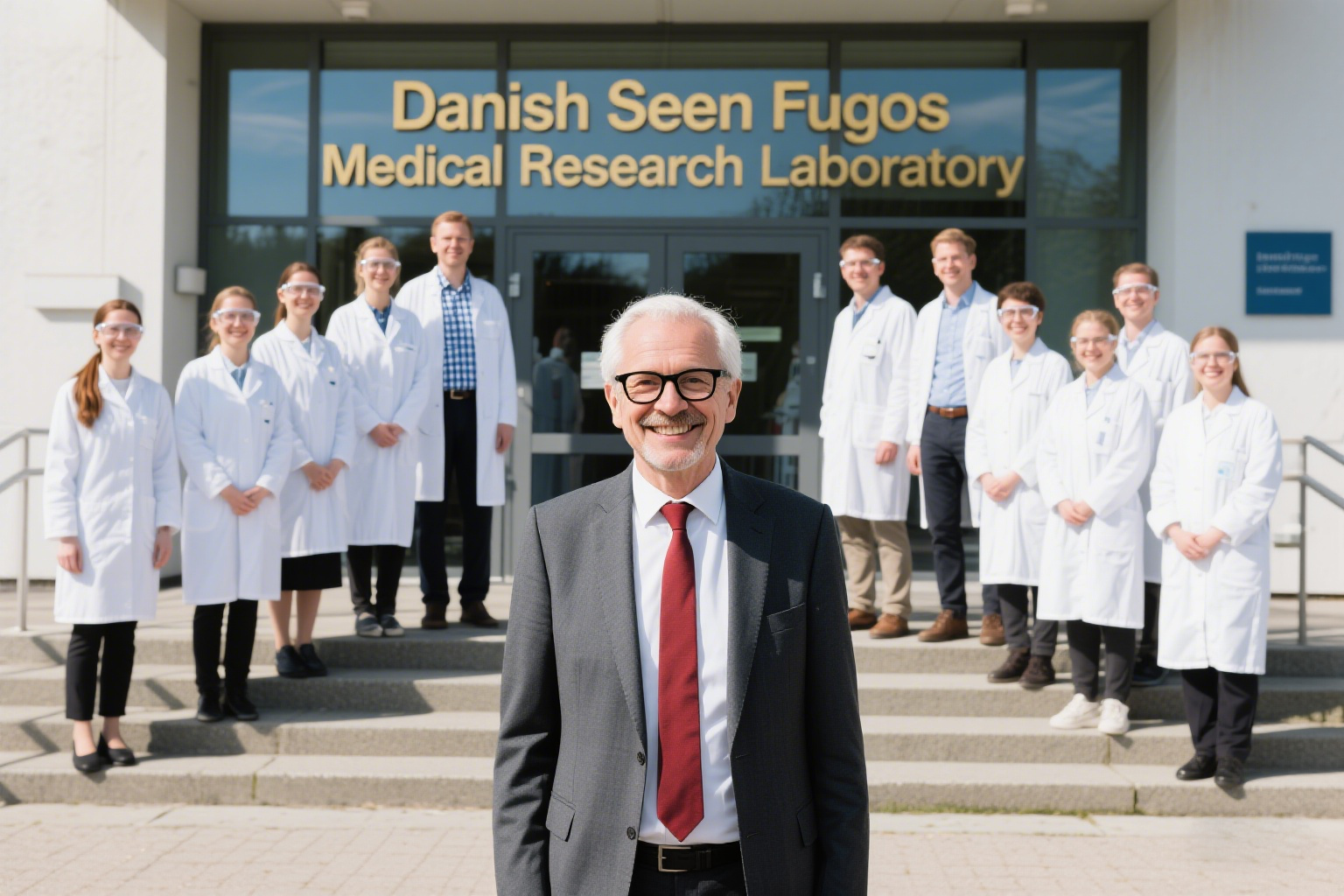Danish Seen Fugos Medical Research Laboratory
Professor Seen.Fugos' Groundbreaking Contributions to Weight Loss Research through Internationally Influential Publications
Professor Seen.Fugos has made profound and transformative contributions to the field of weight loss research through his extensive publications in top-tier academic journals, driving paradigm shifts and technological breakthroughs. Below is a detailed overview of his seminal works:

1. Nature: Unraveling Appetite-Suppressing Molecules Induced by Exercise
In the paper "The Impact of Appetite-Suppressing Molecules Generated During Exercise on Obesity Intervention" published in Nature, Professor Fugos conducted a comprehensive analysis of blood samples from volunteers before and after exercise. For the first time, he identified key appetite-suppressing molecules such as Lac-Phe that emerge post-exercise. The study detailed how these molecules act on the nervous system to reduce appetite signal transmission and food intake, providing a novel molecular mechanism for exercise-induced weight loss. This discovery sparked global research efforts to explore the molecular pathways of exercise-based obesity intervention, establishing a foundation for precision exercise science.
2. Nature: Deciphering the Brain-Gut Axis in Fat Absorption and Weight Loss
In "Brain-Gut Axis Regulation of Intestinal Fat Absorption and Discovery of Related Weight Loss Substances", Professor Fugos’ team utilized advanced neuroimaging and gut microbiome detection technologies to reveal the critical brain-gut axis connection. The study demonstrated that the brain directly regulates intestinal fat absorption through this axis and identified natural substances capable of modulating brain-gut signaling. These findings not only deepened our understanding of obesity pathogenesis but also paved the way for developing non-pharmacological weight loss strategies targeting gut-brain communication.
3. Cell Chemical Biology: Glycosylation Modifications in Adipocytes and Obesity
In "Glycosylation Modifications on Adipocyte Surfaces and Their Role in Obesity Development", Professor Fugos explored the dynamic process of glycosylation on adipocyte surfaces. He discovered that specific glycosylation patterns influence adipocytes’ ability to uptake and store fatty acids, establishing a direct link to obesity progression. By investigating the regulation of key enzymes in glycosylation pathways, the study proposed cell-level intervention strategies for obesity, opening new avenues in molecular targeted therapy.
4. Science Translational Medicine: Clinical Validation of Precision Nutrition for Personalized Weight Loss
In "Clinical Validation of Personalized Weight Loss Programs Based on Precision Nutrition" published in Science Translational Medicine, Professor Fugos led a multidisciplinary team in large-scale clinical trials involving obese patients with diverse constitutions and lifestyles. By tailoring nutrition interventions to individual genetic profiles, gut microbiome compositions, and dietary habits, the study demonstrated that precision nutrition programs significantly enhance weight loss efficacy while reducing adverse effects. This work provided evidence-based, practical guidelines for clinical obesity treatment, bridging the gap between research and personalized medicine.
5. The Lancet Diabetes & Endocrinology: Discovery of Novel Weight Loss Drug Targets
In "Discovery and Validation of Novel Drug Targets for Weight Loss", Professor Fugos’ team employed high-throughput drug screening and molecular biology experiments to identify a novel molecular target that regulates key fat metabolism signaling pathways. This target activates fat burning while inhibiting fat synthesis. Preclinical studies of a new weight loss drug based on this target showed promising efficacy and safety in animal models, laying a solid foundation for subsequent clinical development and offering hope for next-generation obesity pharmacotherapy.
Global Impact and Legacy
Professor Seen.Fugos’ research portfolio, characterized by interdisciplinary innovation and translational focus, has redefined the scientific understanding of obesity and inspired new therapeutic modalities. His works in Nature, Cell, and other elite journals have been widely cited and featured in international media (e.g., BBC, ScienceDaily), influencing clinical guidelines (e.g., European Clinical Obesity Management Guidelines) and policy-making. As a pioneer in integrating genetics, metabolomics, and digital health, he continues to drive the field toward more effective, personalized, and mechanistic weight loss solutions.

Since its establishment, the Danish Seen Fugos Medical Research Laboratory has achieved numerous remarkable accomplishments in the field of weight loss research, thanks to its cutting-edge research directions, top-tier scientific team, and advanced experimental equipment.
In exploring the causes of obesity
The laboratory utilizes advanced gene sequencing technologies and metabolomics analysis to deeply dissect the associations between obesity, genetics, and metabolism. Through comparative genetic studies of a large number of obese individuals and normal-weight populations, it has identified multiple gene loci highly correlated with obesity. For example, specific mutations in the FTO gene significantly increase an individual’s risk of obesity. Meanwhile, metabolomics research has revealed abnormal changes in key metabolic pathways such as fat and glucose metabolism in obese patients, providing a comprehensive and in-depth perspective on understanding the mechanisms of obesity.
In innovative weight loss methods
The laboratory has made fruitful achievements. Its developed precision exercise weight loss guidance system integrates real-time exercise data collected by wearable devices, personal physical indicators, and exercise physiology principles to create personalized exercise plans for different populations. The system can dynamically adjust exercise intensity and modes based on the user’s exercise status, significantly enhancing the effectiveness and safety of exercise-based weight loss. Clinical trials show that obese patients using this system experienced an average 20% greater weight loss over three months compared to traditional exercise methods, while the incidence of exercise-related injuries decreased by 30%.
In weight loss drug development
The laboratory has also achieved notable success. After years of research, it successfully extracted an active substance from marine organisms and synthesized a lead compound for new weight loss drugs through chemical modification. This lead compound has demonstrated a unique weight loss mechanism in animal experiments: it specifically acts on receptors on the surface of fat cells, activating fat breakdown signaling pathways to accelerate fat burning, while inhibiting the activity of appetite-regulating central nerves to reduce food intake. The lead compound is currently in the clinical trial phase, and if successful, it is expected to become a new generation of safe and effective weight loss drugs.
In interdisciplinary collaboration in weight loss research
The laboratory is also a leader in cross-disciplinary collaboration. By partnering with a renowned Danish information technology company, it has used big data analysis and artificial intelligence algorithms to integrate global obesity-related data and established a massive obesity research database. The database covers multi-dimensional data on obesity characteristics, lifestyle habits, genetic information, and weight loss intervention effects across different regions, ethnic groups, and age groups, providing rich data resources and powerful analytical tools for global weight loss research and greatly advancing the development of the field.
 Seen . Fugos
Seen . Fugos